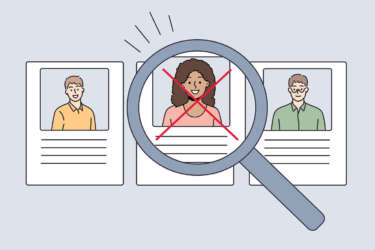
What is discrimination? (in simplified version)
Discrimination is when someone treats you differently
or when a rule gives you fewer opportunities than others
for no good reason
just because you are different.

You may be different from another person because:
- you have white, black or brown skin
- you are poor or rich
- you have a disability
- you are ill
- you believe in the Jewish, Muslim or Catholic religion
- you are young or old
- you are tall or short, fat or thin
- …
There are different types of discrimination:

- direct discrimination
- harassment
- indirect discrimination
- encouraging discrimination
- refusal of reasonable accommodation
- hate crime
- incitement to hatred
- …
All forms of discrimination are against the law.
Direct discrimination

This is when someone treats you differently
for no good reason
just because you are different.
Example:
a landlord refuses to rent you his flat
just because you are disabled.
Direct discrimination is against the law.

Indirect discrimination
Indirect discrimination
is when someone makes you follow a rule that is the same for everyone.
But this rule prevents you from doing certain things
because:
- you have a disability
- you are old
- you are tall
- …

Example:
You go to the cinema.
There is no ticket office at the cinema.
You have to buy the cinema ticket with your phone.
You don't have a phone
or you don't know how to use the Internet.
So you can't buy a cinema ticket.
Because of this rule,
you cannot go to the cinema.
Because of this rule, anyone who
cannot use the Internet properly
because of their disability or age
cannot go to the cinema and are discriminated against.
This rule is called indirect discrimination.
This rule is against the law.
Refusal of reasonable accommodation

All disabled people can ask for help.
This help is called reasonable accommodation.
The aim of reasonable accommodation is to remove an obstacle. Thanks to reasonable accommodation
a person with a disability
will then have the same opportunities as other people.

Refusing reasonable accommodation
without good reason
is against the law.
Example:
You are deaf.
You have been invited for a job interview.
You ask for a sign language interpreter
to help you communicate properly.
The employer refuses to pay for the sign language interpreter and cancels your job interview.
Refusing reasonable accommodation is against the law.
Encouraging discrimination

Encouraging discrimination
is when one person orders another person
to discriminate.
For example:
You work in a bar.
Your manager asks you to hire a new waiter.
But your manager tells you that he doesn't want a black waiter.
A waiter with good experience comes along and you don't hire him because he's black.
You and your manager are discriminating.
You could both be punished
because it's against the law.
Harassment

Harassment is when someone wants to insult you or creates an unpleasant atmosphere for you.
This person’s actions are meant
to hurt you
because you are different.
For example:
someone often makes fun of you
because you are very tall.
Or someone sends insulting messages by e-mail and post because you are disabled.
If it's meant to hurt you
and if it happens often
it's called harassment.
Harassing someone by actions or words
is against the law.
Hate crime

A hate crime is negative and violent behaviour
directed at someone
because they are different.
For example:
someone violently hits another person
just because he is homosexual.
Hate crime is against the law.
Anyone who commits these acts risks going to prison.
Incitement to hatred

Incitement to hatred is the act of saying things
or writing things
that cause other people to attack or insult
a person or group of people
because they are different.
For example:
someone writes on Facebook that we should kill all the black people on the planet
Incitement to hatred is against the law
Do you think you've been discriminated against?

Then contact Unia:
- By calling the free number: 0800 12 800.
Monday to Friday, 9.30 a.m. to 1 p.m.
- By completing a form on our website.